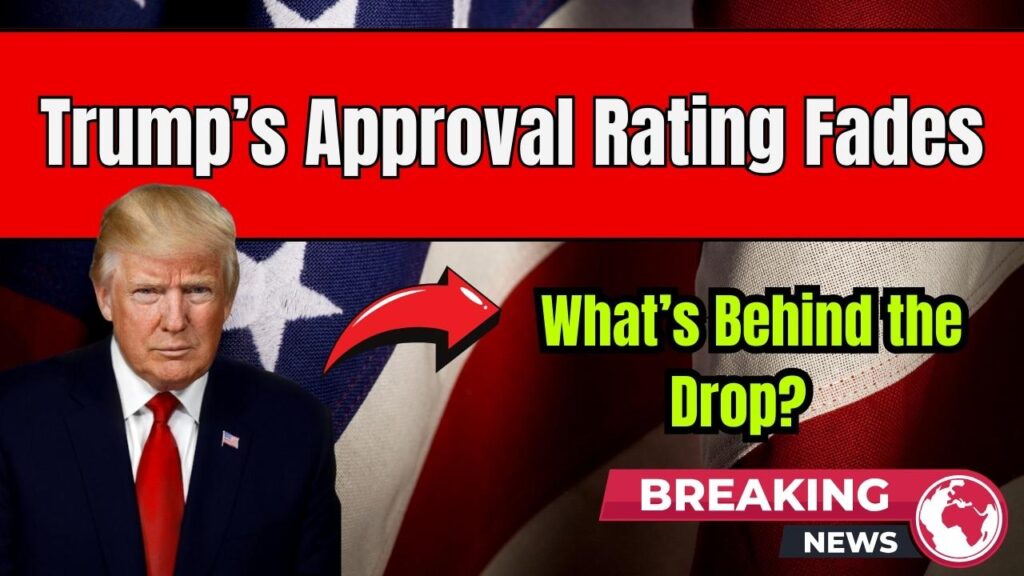Trump’s Approval Rating Fades – Former President Donald Trump’s approval rating has recently seen a noticeable decline, raising questions about what factors are driving this shift. Despite maintaining a strong base of supporters, recent polls suggest waning approval among key demographics. This article explores the reasons behind this drop, analyzes the data, and provides insights into the political and social factors affecting public perception.

Trump’s Approval Rating Fades
| Key Points | Details |
|---|---|
| Approval Rating Drop | Recent polls show a decrease in Trump’s approval, particularly among young voters. |
| Controversial Policies | Executive orders on immigration, social policies, and economic decisions have stirred debate. |
| Public Perception | Perceptions of instability, rapid policy shifts, and billionaire influence in the administration are factors. |
| Latest Polls | Gallup: 47% approval, 48% disapproval (Gallup Poll) |
| Youth Disengagement | Economist/YouGov poll: 39% of young adults support Trump (Independent UK) |
| Economic Concerns | Rising inflation, fluctuating stock market, and corporate tax policies affecting middle-class voters. |
| Public Trust | Growing concerns about ethics in governance, accountability, and transparency. |
Donald Trump’s declining approval ratings reflect a complex mix of policy decisions, public perception, and shifting voter sentiment. While his core supporters remain loyal, concerns over governing style, economic policies, billionaire influence, and ethical transparency are eroding broader approval. As 2025 unfolds, Trump will need to address these challenges to regain public confidence.
Understanding Trump’s Approval Rating Decline
1. Recent Polling Data: A Clear Downtrend
Recent polls indicate that Trump’s approval rating has taken a dip compared to previous months. According to a Gallup poll conducted in late January 2025:
- Approval Rating: 47%
- Disapproval Rating: 48%
The drop is significant because it marks one of the lowest approval ratings for a second-term president at this stage in office. Political analysts suggest that this trend could be linked to various recent events and policy decisions.
2. Key Demographics and Changing Support
Young Voters Turning Away
One of the most notable shifts is among younger voters. An Economist/YouGov poll found that only 39% of adults under 30 approve of Trump, a sharp decline from 50% just two weeks prior (source).
Suburban and Independent Voters
- Recent trends indicate that suburban voters are also distancing themselves, reflecting concerns over economic uncertainty and controversial policies.
- Independent voters, who played a crucial role in the last election, are expressing dissatisfaction with the administration’s handling of social issues and governance style.
3. Controversial Executive Actions and Policy Decisions
Trump’s executive orders and policy decisions have been met with both support and backlash. Some of the most debated actions include:
Immigration Policies
- Proposal to End Birthright Citizenship: A Reuters/Ipsos poll found that 59% of Americans oppose this move (source).
- Increased Border Security Measures: While his base largely supports these efforts, they have alienated more moderate voters.
Economic and Business Decisions
- Trump’s policies favoring big business and tax cuts for corporations have drawn criticism, especially from middle-class Americans who feel left behind.
- The stock market has remained volatile, with concerns over rising inflation and an uncertain economic outlook.
Social and Cultural Decisions
- The administration’s stance on LGBTQ+ rights and reproductive policies has sparked widespread protests.
- Efforts to rename the Gulf of Mexico to the Gulf of America were met with 70% disapproval (source).
4. Public Perception: Chaos and Billionaire Influence
Concerns Over Governing Style
Many voters feel that Trump’s approach to governance has been unpredictable. A recent Navigator poll highlighted that respondents described his leadership as:
- “Chaotic”
- “Moving too fast without proper planning”
Elon Musk and Billionaire Influence
The role of Elon Musk and other wealthy tech figures in the administration has raised red flags for some Americans. While these figures bring business acumen, critics argue that their influence prioritizes corporate interests over public needs.
5. Ethical and Transparency Concerns
Voters have increasingly raised concerns about ethics in governance and transparency. Allegations of conflicts of interest and questions about campaign financing are leading factors in declining trust.
6. Media Coverage and Opposition Influence
Media Narratives
The mainstream media and social media have played a major role in shaping public perception. Negative press coverage of policy failures and scandals has likely influenced approval ratings.
Democratic Opposition Strategy
- Democrats have capitalized on the discontent, emphasizing Trump’s controversial decisions.
- Opposition ads and campaigns are targeting swing voters, highlighting policy missteps.
Trump’s ‘Day One’ Promise to Lower Costs Is Already Falling Apart
Trump’s New Tax Plan Could Cost the US $4.5 Trillion, Republicans Reveal
Court Clears the Way for Trump’s Federal Resignation Program – What’s Next?
FAQs
1. Why is Trump’s approval rating dropping?
Trump’s approval rating is declining due to controversial executive actions, shifting voter demographics, and concerns about his governing style.
2. Which demographic groups are showing the biggest decline in support?
Young voters, suburban voters, and independents are showing the largest declines in approval.
3. How does Trump’s approval compare to past presidents?
Trump’s approval rating is among the lowest for a second-term president at this stage, comparable to George W. Bush in 2007.
4. Can Trump recover his approval ratings?
It is possible, depending on economic improvements, effective policy implementation, and shifts in media coverage.
5. What role does the economy play in approval ratings?
Economic uncertainty, inflation, and tax policies significantly impact public perception and approval ratings.







